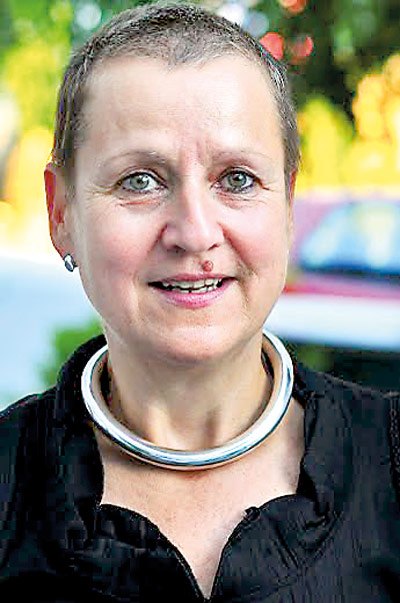New cultural winds at the Goethe Institut
 Dr. Petra Raymond, the new Director of the Goethe Institut, Sri Lanka, popularly known as the German Cultural Institute, has strong views on the role of culture in contemporary society.
Dr. Petra Raymond, the new Director of the Goethe Institut, Sri Lanka, popularly known as the German Cultural Institute, has strong views on the role of culture in contemporary society.
Still closely studying the Lankan cultural scene, she says, “I did not bring a suitcase of ideas. I am instead, listening and watching and based on my findings, I will develop our cultural programmes.”
One of her first cultural experiences in Sri Lanka was the Fairway Galle Literary Festival 2016, which the Goethe-Institut partnered with this year as well.
She said it did evoke much interest as people enjoyed meeting their favourite writers, listening to the award-winners and participating in the discourses on their books.
Emphasis of the festival however, should have been on the promotion of Lankan and South East Asian writing while culinary demonstrations should have been given less prominence, she felt. Such events, she says, make the festival more “touristic”.
The Goethe-Institut presented the award-winning German crime writer Andrea Maria Schenkel of “The Murder Farm” fame at the Festival where her books came under discussion. She also served on the panel of “The art of the thriller and mystery novel.”
Before taking up the posting here, Dr. Raymond served as the Head of the Language Department of the Goethe-Institut in Damascus, Syria (1996-2000) and thereafter was Director of the Goethe-Institut in Accra, Ghana (2000-2004.) She was in Karachi till 2008 from where she went across to Herzegovina, Bosnia and to Manila- postings which had set her off on a voyage of cultural discovery.
The contrasting cultures she experienced have evidently inculcated in her a strong interest in the cultures of others. She says “the more you know about the history, different cultural patterns and the way of life of others, the more you become humble.
When you learn the rich cultures, the variety of life and the way other cultures have developed, that makes you understand your own cultural development better.”
Dr. Raymond believes that learning a language builds bridges with other cultures although culture should not be forced on others.
Theatre, as a part of culture, should be rooted in the traditions but be modified to make it relevant to the modern context.When theatre is based on history or kings and queens, it evokes little excitement as you already know the story.
Therefore, the subject-matter should not be “frozen” in the museum. Stemming from the roots, theatre and the arts must be interpreted and made into a cultural translation, she says.
The same goes with dance forms. In Germany, as the compositions of classical music are well known, it is integrated with the new.
Whether it is theatre, literature, music, art or dancing, the artiste has to think anew and be provocative. Development should never end.She should know as her pet subject at the Westfälische Wilhelms University in Münster where she studied, has been science of history along with the German language and literature. She received her Ph.D. in German literature from the Friedrich Alexander Universität in Erlangen-Nürnberg.
The arts however, she says, has to be nurtured. In Germany, its development is complex but almost every German city has a theatre at communal level.
There are theatre-groups even in schools and ample incentives exist for those interested to pursue the arts. In Sri Lanka, chances she has found, are fewer for the arts to grow.
She said “when an event is named a festival, whether it is a literary, drama or any cultural festival, it should have participation of the audience.
Award-winners should be able to talk to those who have come to meet them and answer their queries. It is the task of the nation to provide the festivals the necessary funds to enable such cultural participation.”
She finds a lack of facilities in Sri Lanka for theatre-groups to hold practices. Free access to places like the Lotus Theatre, whether to perform or for practices, is denied. Dramatists are not businessmen and there are no financiers to fund their artistic pursuits.
This is a pathetic situation, she finds. Also, artistes should be provided the freedom to freely express themselves and interpret their sensibilities meaningfully as arts is “yeast” to the society.
She is also involved with Colomboscope – a multidisciplinary arts festival sponsored by the Cinnamon group of hotels and resorts which gives exposure to Lankan and international artistes.
The Goethe-Institut along with the British Council and Alliance Française de Kotte form the European Union National Institute for Culture (EUNIC) which supports this.
For those in the tourist-oriented fields in Kandy such as guides and hoteliers, the Goethe-Institut holds German language classes.
The lively lady-director loves spicy food and enjoys her rice and curry on returning from work to her home at Torrington Square.
Daily she walks from home through the walking tracks to the Institute on Gregory’s Road and back – an exercise that may be inspiring her to explore Lankan culinary flavours while on her journey exploring the vibrant fusion of Lankan culture.


